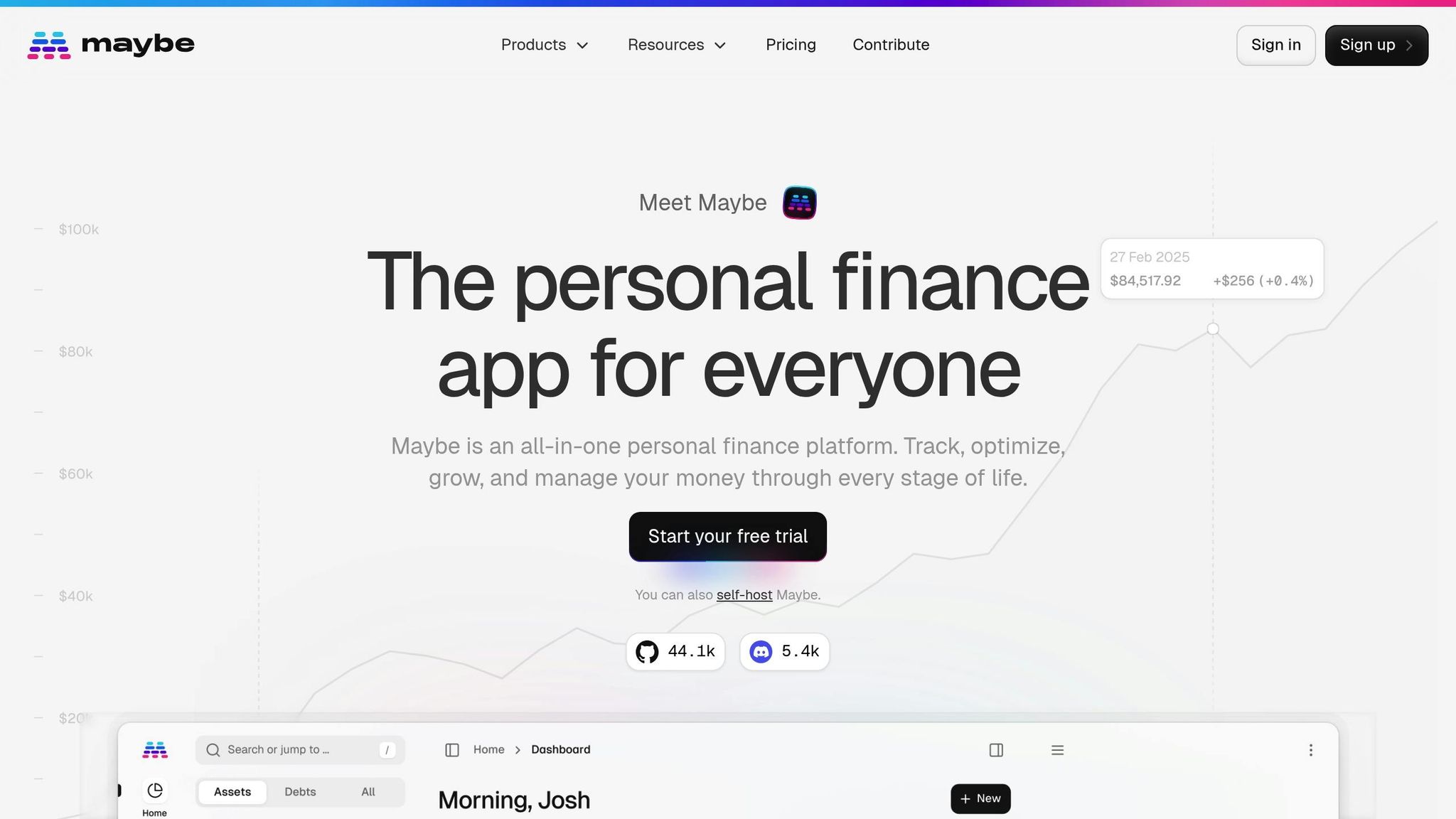How To Use Financial Calendars For Budgeting

Josh Pigford
Want to master your finances? Start using a financial calendar. It’s a simple tool to track income, expenses, savings, and deadlines - all in one place. Here’s what you’ll gain:
- Avoid late fees and overdrafts: Plan your cash flow to ensure bills are paid on time.
- Reach savings goals faster: Set and track deadlines for goals like vacations or emergency funds.
- Reduce financial stress: Keep all your money-related dates organized to avoid surprises.
How to start:
- List all your income, bills, and financial deadlines.
- Choose a format: digital calendars offer alerts, while paper calendars let you customize manually.
- Organize with color coding, priority levels, and categories.
Tools like Maybe Finance can automate tracking, sync accounts, and even forecast budgets using AI. Whether you prefer digital or paper, a financial calendar helps you stay in control of your money.
Creating Your Financial Calendar
Here’s how you can set up a financial calendar tailored to your needs.
List Your Financial Dates
Start by compiling all your recurring financial obligations into one master list. Include the following:
Regular Income
- Paycheck deposits (bi-weekly or monthly)
- Investment dividends
- Rental income
- Side hustle earnings
Fixed Expenses
- Mortgage or rent payments
- Car loans
- Insurance premiums
- Subscription services
- Utility bills
Annual Financial Events
- Tax filing deadlines (e.g., April 15)
- Property tax payments
- Insurance renewals
- Annual subscriptions
- Vehicle registration
Once you have your list, think about the type of calendar that works best for you.
Digital vs. Paper Calendars
Both digital and paper calendars have their pros and cons, so it’s important to pick one that aligns with your preferences. Here’s a quick comparison:
| Feature | Digital Calendar | Paper Calendar |
|---|---|---|
| Transaction Tracking | Automatic updates | Manual entry required |
| Payment Alerts | Real-time notifications | No automated reminders |
| Data Security | Encrypted protection | Risk of physical loss |
| Budget Forecasting | AI-based projections | Manual calculations |
| Accessibility | Available across devices | Limited to one location |
For example, tools like Maybe Finance can automatically track transactions from thousands of institutions, saving you time and effort.
Organize Your Calendar Entries
Once you’ve chosen your calendar type, organize your entries to make them easy to follow. Here are some useful strategies:
Color Coding
- Green for income
- Red for bills and expenses
- Blue for savings transfers
- Yellow for important deadlines
Priority Levels
Rank your entries based on their importance:
- Critical: Tax deadlines, loan payments
- Important: Utility bills, insurance premiums
- Routine: Subscriptions, regular transfers
Smart Categorization
Group similar activities together for clarity:
- Housing expenses
- Transportation costs
- Healthcare payments
- Entertainment subscriptions
If you’re using a digital calendar, take advantage of features like custom tags and filters to quickly locate specific entries. A well-organized financial calendar ensures you stay on top of your commitments and never miss an important date.
Maybe Finance Calendar Tools

Maybe Finance transforms your financial calendar into a dynamic budgeting assistant, making it easier to track and plan your finances.
Auto-Track Your Transactions
Say goodbye to manual data entry. Maybe Finance connects with over 10,000 financial institutions to simplify your financial tracking. Once linked, the platform:
- Imports and categorizes transactions automatically.
- Syncs account balances for a complete financial snapshot.
- Consolidates your accounts into one unified view.
Want even more control? You can set custom rules to sort transactions into specific categories, manually log entries, or upload CSV files to ensure nothing gets missed.
Next up: see how smart forecasting can elevate your budgeting game.
Smart Budget Forecasts
Tracking is just the beginning. Maybe Finance takes it further with AI-driven budget forecasting. By analyzing your spending habits, the platform helps you plan ahead effectively. Here's how it works:
- Monitors category balances to keep you on track.
- Identifies spending trends for better financial awareness.
- Recommends budget adjustments tailored to your goals.
You can tweak category budgets to align with your financial priorities, and the platform provides insights to fine-tune these allocations when necessary.
| Budget Feature | What It Does for You |
|---|---|
| Category Tracking | Offers real-time updates on spending by category |
| Smart Allocations | Suggests budget distributions based on your habits |
| Balance Monitoring | Keeps you informed with real-time category balances |
| Trend Analysis | Provides visual breakdowns of spending patterns over time |
With these tools, Maybe Finance makes budgeting smarter and more intuitive.
Keep Your Calendar Updated
Once you've set up your financial calendar, keeping it up to date is key to making it a reliable budgeting tool. Regular updates ensure your calendar reflects your current financial situation, helping you stay on track. Here’s how to keep it accurate and effective.
Monthly Calendar Review
Make it a habit to review your calendar every month. Compare your planned expenses with actual transactions to see where things align - or don’t. Maybe Finance's tools, like transaction history, smart alerts, and spending summaries, can help you identify any discrepancies. Use this review to tweak upcoming entries, especially for recurring bills, subscription renewals, or any financial commitments on the horizon.
Update During Major Changes
Big financial changes, like a new job or an unexpected expense, call for immediate updates to your calendar. Adjust your entries to reflect your new circumstances so your budget stays relevant.
| Change Type | What to Update |
|---|---|
| Income Changes | Reallocate your monthly budget |
| New Bills/Expenses | Add payment dates and amounts |
| Subscription Changes | Modify recurring payment details |
| Account Changes | Update linked financial institution info |
Maybe Finance makes it easy to adapt. Use its customization tools to revise budget categories, adjust allocations, or create new rules that match your updated financial flow.
Protect Your Financial Data
Don’t overlook security. Regularly check your account settings and update your passwords. Enable all available security features to keep your financial information safe and secure.
Conclusion: Put Your Calendar to Work
A financial calendar can transform budgeting into a practical and effective tool for managing your money. By helping you avoid late fees and overdraft charges, you could save anywhere from $30 to $100 each month. Plus, many users see their savings grow by 5–15% simply by gaining a clearer picture of their expenses and planning ahead.
Benefits Over Time
Sticking with a financial calendar can make a noticeable difference in your financial life. Within six months of consistent use, most people experience a 60% drop in financial stress. This is largely due to better visibility into cash flow, which can help break the paycheck-to-paycheck cycle. Here’s how the benefits typically stack up over time:
| Timeframe | Typical Improvements |
|---|---|
| 2–3 Months | Late fees and overdraft charges disappear |
| 3–6 Months | Credit scores improve by 20–40 points |
| 6+ Months | Impulse spending decreases by 10–30% |
Start with Maybe Finance
If you’re ready to take the leap, consider starting with Maybe Finance. This platform makes calendar budgeting a breeze by connecting with over 10,000 financial institutions to automatically track your transactions and flag recurring payments. With the help of AI, you can refine your budget, and its multi-currency support ensures all your financial obligations are visible in one place.
Maybe Finance also lets you set automated bill reminders, schedule quarterly check-ins, and customize budgeting tools to meet your needs. For those who value privacy, the secure, self-hosted option keeps your financial data fully under your control. It’s a smart way to stay on top of your finances and build long-term confidence in your money management.
FAQs
What’s the best way to choose between a digital or paper financial calendar for budgeting?
Choosing between a digital or paper financial calendar comes down to what fits your lifestyle and preferences best. Digital calendars offer convenience, automation, and the ability to access your schedule across multiple devices. They let you set reminders, sync with other apps, and see updates instantly. On the flip side, paper calendars cater to those who enjoy the act of writing things down, prefer a screen-free approach, or like having a physical layout they can easily glance at.
When making your choice, consider how you manage your daily routines and finances. If you’re already relying on digital tools to handle your money, a digital calendar could blend right in. But if you find satisfaction in physically marking dates and notes, a paper calendar might keep you more engaged with your budgeting process.
How can I keep my financial calendar updated and secure?
To keep your financial calendar both accurate and secure, start by routinely reviewing and updating your entries. Whenever you confirm recurring expenses, income, or key financial dates (like bill due dates or tax deadlines), add them right away. Setting reminders for these events can help you stay on top of important deadlines.
When it comes to security, choose a platform that emphasizes protecting your data. Look for features like encryption and two-factor authentication (2FA) to safeguard your information. Avoid including sensitive details in calendar notes, and make sure your devices are running the latest security updates.
With regular updates and a focus on security, your financial calendar can serve as a powerful tool for staying on top of your budget.
How can a financial calendar and tools like Maybe Finance make budgeting easier?
Using a financial calendar alongside AI-powered tools like Maybe Finance can make budgeting much more manageable. A financial calendar keeps all your key dates in one place - like bill due dates, paydays, and savings milestones - helping you stay organized and avoid missing deadlines. By laying out your financial schedule visually, you can plan ahead and sidestep any unexpected surprises.
Maybe Finance takes this concept further by offering automated reminders for upcoming expenses, real-time spending tracking, and insights into your financial habits. With its AI-driven suggestions, you can spot areas to save or fine-tune your budget, making it easier to stick to your plans and hit your financial targets.

Subscribe to get the latest updates right in your inbox!